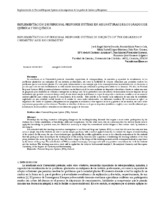Implementación de personal response systems en asignaturas de los Grados de Química y Bioquímica
Implementation of personal response systems in subjects of the Degrees of Chemistry and Biochemistry
Autor
Salatti Dorado, José Ángel
Fresco-Cala, B.
López Martínez, M.I.
Ríos Gómez, Julia
Cárdenas, Soledad
Fernández-Romero, J.M.
Romero-Salguero, F.J.
Editor
UCOPressFecha
2018Materia
Personal Response System (PRS)Kahoot
METS:
Mostrar el registro METSPREMIS:
Mostrar el registro PREMISMetadatos
Mostrar el registro completo del ítemResumen
La enseñanza en la Universidad pretende desarrollar capacidades de autoaprendizaje, de iniciativa y capacidad de visualización de los problemas planteados en cualquiera de sus ámbitos profesionales, así como la habilidad de adoptar soluciones que permitan resolver los problemas que la sociedad les plantee. Por otra parte, la innovación es un concepto que debe ir incorporándose transversalmente a la docencia, es por ello que cada vez más habitualmente se están usando herramientas que estimulan la participación activa de los alumnos. Por ello, los Personal Response Systems (PRS) permiten al alumno establecer un feedback con el docente mediante un dispositivo electrónico donde se realiza una serie de preguntas y los resultados se obtienen e interpretan en tiempo real. Se ha pretendido con este artículo de innovación docente disponer de una herramienta que permita conocer en tiempo real y de una forma simple si el alumno es capaz de responder a cuestiones sencillas, con un marcado carácter aplicado para evaluar el grado de comprensión de la materia. Este artículo se ha basado en la realización de una serie de actividades englobadas en una actividad central basada en el estudio de casos reales relacionados con diferentes temáticas El cuestionario se aplicó en asignaturas del Grado de Química y Bioquímica en las preguntas se realizaron sobre aspectos teóricos y prácticos de las mismas, así como sobre exposiciones preparadas por los alumnos. También se introdujo el idioma en el que se impartían (castellano e inglés) como variable adicional para la evaluación de los resultados obtenidos en los diferentes grupos de docencia. Nowadays the teaching context is undergoing changes in the teaching-learning binomial that require a more active participation by the students for a better assimilation of knowledge, skills and competences. On the other hand, it is also necessary that the student knows how to apply this knowledge to practical cases, for which it is necessary to adapt the conventional methodologies so that custom work by students is encouraged.
It is intended with this teaching innovation investigation to use Personal Response Systems (PRS) as a tool that allows to know in real time and in a simple way if the students are able to answer simple questions, with a marked applied character, to evaluate the degree of understanding of the subject. In this sense, the use of new technologies, specifically the mobile applications, seems to be a friendly environment for the students that will predispose them favorably to the development of this activity. Since it is also a question of facilitating the teaching initiation of the four young teachers who make up this proposal, they will be in charge of the design of this teaching material and its subsequent evaluation supervised by the tutors of the group. The introduction of PRS in a subject can imply a new approach with very positive connotations for both the students and the teachers. The teaching innovation work will be applied in the subjects Instrumental Analysis I, Bioanalytical Chemistry and Bioorganic Chemistry, of the degrees of Chemistry and Biochemistry.

